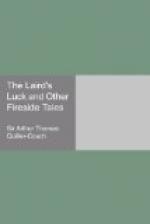“Ah! What became of him?”
“I did hear he was dead too,” said Joshua Martin, “out in Canady somewhere. But that may be lies,” he added cheerfully.
Nat made no further comment, but paid for his gin-and-water, picked up his carpet bag, and went out to seek for a cottage. On his way he eyed the thatched roofs critically. “Old Thatcher Hockaday will be dead,” he told himself. “There’s work for me here.” He felt certain of it in Farmer Sprague’s rick-yard. Farmer Sprague owned the two round-houses at the seaward end of the village, and wanted a tenant for one of them. Nat applied for it, and declared his calling.
“Us can’t afford to pay the old prices these times,” said the farmer.
Nat’s eyes had wandered off to the ricks. “You’ll find you can when you’ve seen my work,” he answered.
Thus he became tenant of the round-house, and lived in it to the day of his death. No one in my day knew when or how the story first spread that he had been in the army and deserted. Perhaps he let slip the secret in his cups; for at first he spent his Saturday evenings at the King of Bells, dropping this habit when he found that every soul there disliked him. Perhaps some discharged veteran of the 4th, tramping through Gantick in search of work, had recognised him and let fall a damning hint. Long before I can remember the story had grown up uncontradicted, believed in by everyone. Beneath it the man lived on and deteriorated; but his workmanship never deteriorated, and no man challenged its excellence.
About a month before his death (I have this from the postmistress) he sat down and wrote a letter, and ten days later a visitor arrived at the round-house. This visitor the Jago family (who lived across the road) declare to have been Satan himself; they have assured me so again and again, and I cannot shake their belief. But that is nonsense. The man was a grizzled artizan looking fellow well over fifty; extraordinarily like the old Thatcher, though darker of skin—yellow as a guinea, said Gantick; in fact and beyond doubt, the old man’s son. He made no friends, no acquaintances ever, but confined himself to nursing the Thatcher, now tied to his chair by rheumatism. One thing alone gives colour to the Jagos’ belief; the Thatcher who had sent for him could not abide the sight of him. The Jago children, who snatched a fearful joy by stealing after dark into the unkempt garden and peering through the uncurtained lattice windows, reported that as the pair sat at table with the black bottle between them, the Thatcher’s eyes would be drawn to fix themselves on the other’s with a stealthy shrinking terror—or, as they put it, “vicious when he wasna’ lookin’ and afeared when he was.”
They would sit (so the children reported) half an hour, or maybe an hour, at a time, without a word spoken between them; but, indeed, the yellow stranger troubled few with his speech. His only visits were paid to the postmistress, who kept a small grocery store, where he bought arrowroot and other spoon-food for the invalid, and the Ring of Bells, where he went nightly to have the black bottle refilled with rum. On the doctor he never called.




